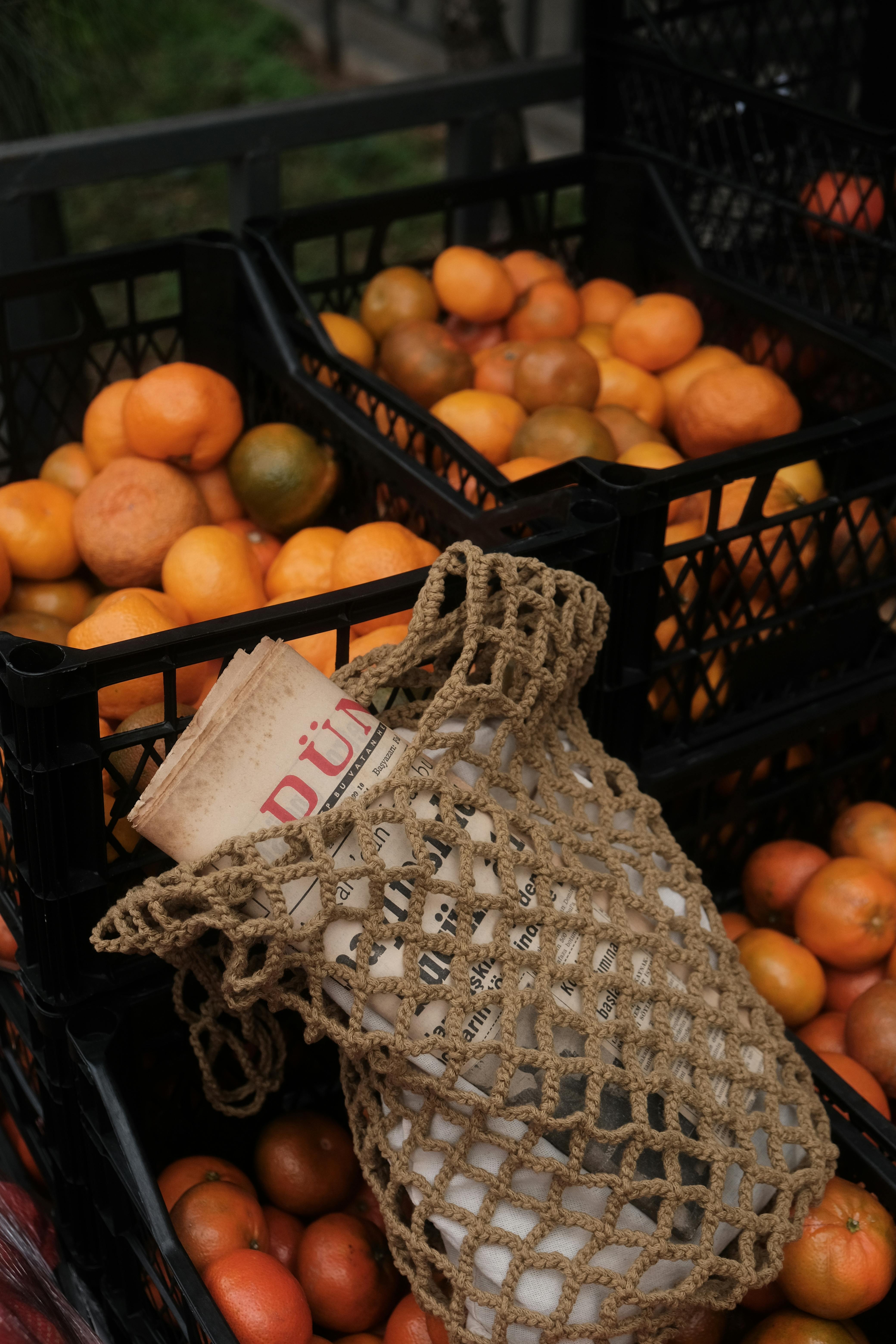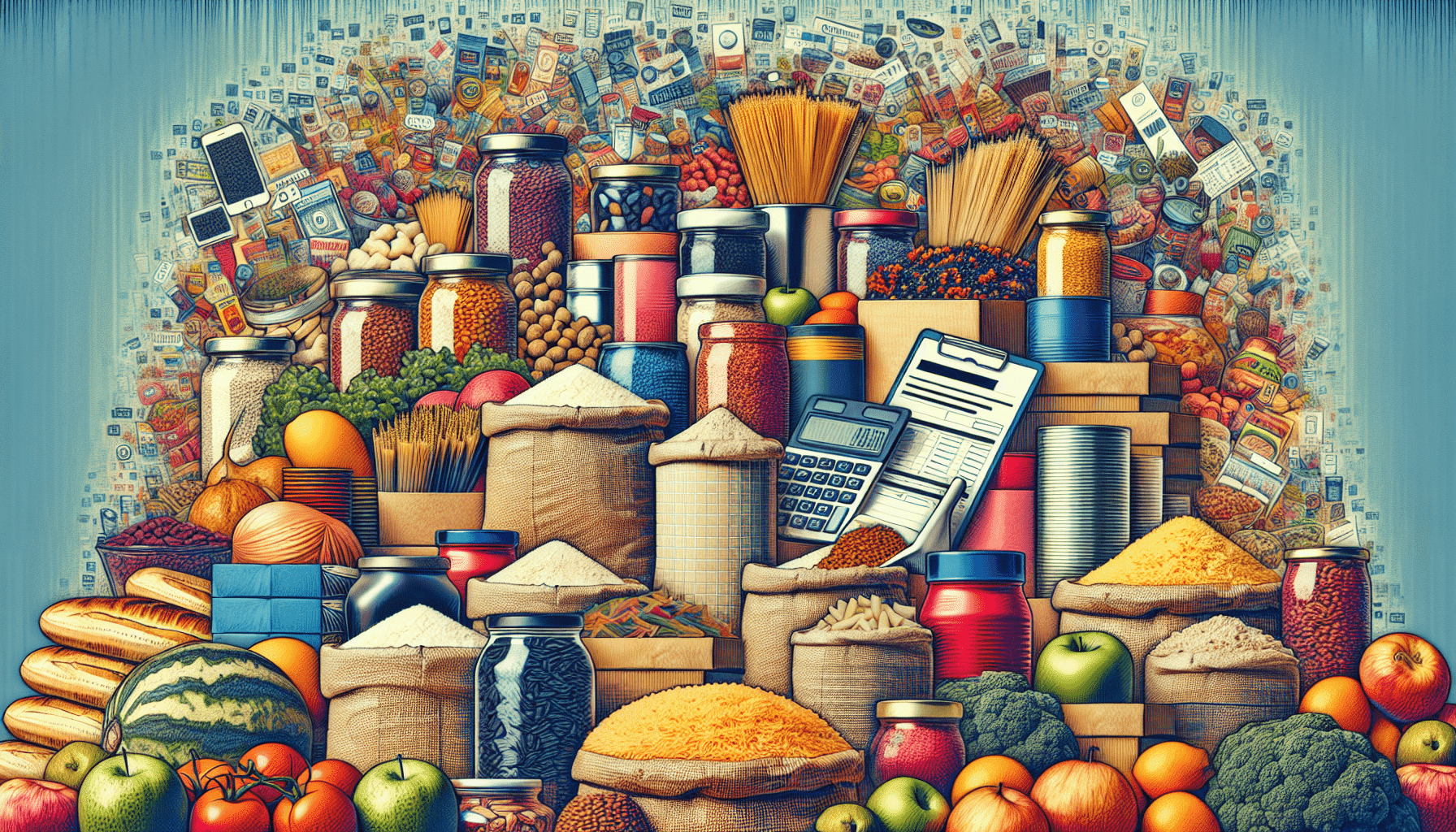Are you tired of spending too much money on groceries each month? Look no further! In this article, we will explore some effective strategies for shopping in bulk and saving on household food costs. By implementing these tips, you will be able to stretch your budget further, stock up on essentials, and ultimately achieve significant savings. So, get ready to revolutionize your shopping routine and discover how to make the most out of buying in bulk!

Meal Planning
Create a weekly meal plan
Meal planning is a simple yet effective way to save both time and money. By sitting down once a week to plan out your meals, you can ensure that you have all the ingredients you need on hand, which means fewer trips to the grocery store and less impulse buying. Start by brainstorming a list of meals that you and your family enjoy. Then, take a look at your schedule for the week and consider any special events or commitments that may affect your mealtime. From there, create a plan that includes a variety of meals and balances out your protein, carbohydrate, and vegetable intake.
Make a shopping list based on the meal plan
Once you have your meal plan in place, it's time to create your shopping list. Take a careful look at each recipe and write down all the ingredients you'll need, making sure to check your pantry and fridge to see if you already have any of them. Organize your list by category (e.g., produce, dairy, pantry items) to make navigating the store easier. Having a detailed shopping list not only saves you time wandering the aisles, but it also helps you stick to your budget by avoiding unnecessary purchases.
Stick to the list while shopping
When you get to the grocery store, it's essential to stick to your list. Avoid the temptation to deviate from the plan and purchase items that aren't on your list. Impulse buying can quickly add up and derail your budget. Instead, focus on grabbing the items you need and resisting the urge to reach for those tempting snacks or treats. By staying disciplined and only buying what's on your list, you'll be able to stay within your budget and have a successful shopping trip.
Buy in Bulk
Purchase larger quantities of non-perishable items
Buying in bulk is a cost-effective strategy that can help you save money in the long run. Non-perishable items such as rice, pasta, canned goods, and cleaning supplies can often be purchased in larger quantities at a lower price per unit. Check the unit price, which is usually indicated on the shelf label, to see if buying in bulk is a good deal. By stocking up on these items, you can reduce the frequency of your trips to the store and avoid running out of essentials.
Consider joining a wholesale club
Wholesale clubs, such as Costco or Sam's Club, can offer significant savings on a wide range of products. These clubs require a membership fee, but the savings can often outweigh the cost. You'll find bulk sizes of everything from food to household items, electronics, and even furniture. Before joining, it's essential to assess your needs and determine if the membership fee and the bulk quantities align with your consumption habits.
Look for bulk sections in regular grocery stores
If you don't want to commit to a wholesale club membership, you can still find bulk options in regular grocery stores. Many stores have bulk sections where you can purchase items like grains, nuts, spices, and even snacks by weight. By buying only the amount you need, you can reduce waste and save money. Just be sure to check the prices and compare them to packaged alternatives to ensure you're getting the best deal.
Compare Prices
Check prices at different stores
One of the most effective ways to save money on groceries is by comparing prices at different stores. Don't limit yourself to just one store; instead, take the time to visit multiple grocery stores in your area. Pay attention to the prices of the items you regularly buy and note any significant price differences. By doing so, you can identify which stores offer the best deals and make more informed shopping decisions.
Look for sales and discounts
In addition to comparing regular prices, keep an eye out for sales and discounts. Many grocery stores run weekly or monthly promotions, offering reduced prices on certain items. Check the store's weekly advertisements or sign up for their newsletters to stay updated on the latest deals. You can also look for discount codes and coupons online to further reduce your grocery bill. By taking advantage of these offers, you can maximize your savings and stretch your budget.
Consider generic or store brands
When comparing prices, don't forget to look beyond the popular name brands. Generic or store brands often offer similar quality at a lower cost. Take the time to compare ingredients and nutritional information to ensure that the generic brand meets your needs. You might be surprised to find that many generic products are just as good, if not better, than their more expensive counterparts. By opting for these alternatives, you can save a significant amount of money without sacrificing quality.
Use Coupons and Vouchers
Collect coupons from newspapers and magazines
Coupons are a classic money-saving tool that can significantly reduce your grocery expenses. Many newspapers and magazines include coupon inserts that you can clip and use at the store. Keep an eye out for these inserts and cut out any coupons for products you regularly use. Alternatively, you can also visit websites that offer printable coupons for a wide range of items. By always having a collection of coupons on hand, you can take advantage of discounts whenever you shop.
Sign up for newsletters and online coupon websites
To stay up to date with the latest deals and discounts, consider signing up for newsletters from your favorite grocery stores. These newsletters often contain exclusive coupons and information about upcoming sales. Additionally, there are many websites dedicated to providing users with the latest coupons for various products. By regularly checking these websites, you can find valuable coupons that can help you save money.
Redeem loyalty rewards and vouchers
Another way to save money while grocery shopping is by redeeming loyalty rewards and vouchers. Many stores offer loyalty programs where you accumulate points or earn discounts based on your purchases. Take advantage of these programs by signing up and utilizing your rewards when you shop. Additionally, some stores may offer vouchers or coupons for specific products or dollar amounts. Be sure to check if you have any of these available and use them during your shopping trips.

Stock Up on Sale Items
Buy extra when items are on sale
When you come across items that you regularly use or items that have a long shelf life on sale, it's a good idea to stock up and buy extra. By purchasing more than you immediately need, you can take advantage of the lower price and ensure that you won't run out of that item anytime soon. This strategy is particularly effective for non-perishable items such as canned goods, pasta, and cleaning supplies. Just be sure to consider storage space and expiration dates when stocking up.
Store and organize food properly
Proper storage and organization are key when it comes to saving money and reducing waste. Make sure you have a designated storage area for your groceries, preferably one that is cool, dry, and away from direct sunlight. Perishable items should be stored in the refrigerator or freezer to extend their shelf life. Additionally, using airtight containers or resealable bags for opened items can help prevent spoilage. By storing your food properly, you can ensure that it stays fresh, reducing the need to repurchase items prematurely.
Pay attention to expiration dates
While stocking up on sale items is a great money-saving strategy, it's essential to pay attention to expiration dates. Make sure to rotate your stock and use older items first to avoid any waste. When shopping, be mindful of expiration dates as well and try to choose items with the longest shelf life. By managing your stock effectively and using items before they expire, you can save money and minimize food waste.
Cook in Bulk
Prepare meals in large batches
Cooking in bulk is a fantastic way to save time and money in the kitchen. By preparing meals in larger quantities, you eliminate the need to cook from scratch every day, saving valuable time. Additionally, cooking in bulk allows you to take advantage of sales and discounts on ingredients, as you'll be buying larger amounts. Choose recipes that freeze well, such as soups, stews, and casseroles, and dedicate a day or two each week to meal prepping. You can portion out the prepared meals for the week and have ready-made dinners that only require reheating.
Portion and freeze leftovers for future meals
When you have leftovers, don't let them go to waste. Instead, portion them out and freeze them for future meals. Having a stockpile of frozen meals comes in handy on busy days when you don't have time to cook or when unexpected guests arrive. Make sure to label each container with the contents and date to keep track of what's in your freezer. By utilizing your leftovers efficiently, you not only save money but also reduce food waste.
Avoid food waste and save time
Cooking in bulk not only saves money but also helps minimize food waste. When you plan your meals and cook in larger quantities, you can strategically use ingredients, reducing the risk of them going bad before you have a chance to use them. Additionally, by knowing what meals you have on hand, you can avoid overspending on unnecessary groceries. Cooking in bulk also saves time since you're only in the kitchen for a dedicated period rather than cooking every day. This frees up time for other activities or allows you to spend more quality time with your loved ones.

Use Seasonal Produce
Buy fruits and vegetables when they are in season
Seasonal produce not only tastes better but is also often cheaper than out-of-season produce. When fruits and vegetables are in season, they are at their peak freshness, flavor, and nutritional value. Take advantage of this by buying produce when it is abundant, which usually leads to lower prices. Visit local farmers markets or look for signs in grocery stores to find out which fruits and vegetables are currently in season. By incorporating seasonal produce into your meals, you can enjoy a variety of flavors while saving money.
Preserve seasonal produce for later use
If you come across a great deal on seasonal produce, consider preserving it for later use. Freezing fruits and vegetables is a simple and effective way to extend their shelf life while maintaining their quality. You can freeze berries, peaches, and other fruits for use in smoothies or desserts. Vegetables like broccoli, peas, and corn can also be blanched and frozen for later use. Preserving seasonal produce ensures that you can continue enjoying its flavors and nutritional benefits even when it's out of season.
Explore different cooking methods
When working with seasonal produce, don't be afraid to experiment with different cooking methods. Roasting, grilling, sautéing, or steaming can all bring out unique flavors and textures in fruits and vegetables. By trying different cooking techniques, you can discover new ways to enjoy seasonal produce and avoid getting stuck in a culinary rut. Explore online recipes, cookbooks, or cooking shows for inspiration and get creative with your meals. Not only will you enjoy delicious dishes, but you'll also make the most of seasonal produce.
Reduce Food Waste
Plan meals based on what you already have
Reducing food waste starts with thoughtful meal planning. Before you head to the grocery store, take stock of what you already have in your pantry, fridge, and freezer. Plan your meals around the ingredients you have on hand, making sure to use perishable items before they go bad. By planning your meals this way, you avoid buying duplicates and using up what you already have, reducing both waste and expenses. Additionally, planning meals around what you already have can lead to creative and exciting dishes you may not have thought of otherwise.
Properly store perishable items
Proper storage is crucial when it comes to reducing food waste. Pay attention to the storage requirements of different fruits, vegetables, meats, and dairy products. Vegetables like lettuce and herbs benefit from being stored in airtight containers or bags with a damp paper towel to prolong their freshness. Fruits like bananas and avocados can be stored at room temperature until they reach the desired ripeness, at which point they can be refrigerated. Understanding how to store different items properly can help extend their shelf life and prevent unnecessary waste.
Repurpose leftovers into new dishes
Leftovers don't have to be boring or go to waste. Instead of eating the same meal for days on end, get creative and turn your leftovers into new dishes. Leftover rotisserie chicken can be transformed into a delicious chicken salad or added to a stir-fry. Vegetables can be used in sandwiches, wraps, or omelets. By repurposing your leftovers, you not only add variety to your meals but also save money by using up ingredients you already have. Get creative in the kitchen and see how many different meals you can make from one original dish.

Track Expenses
Keep a record of your grocery expenses
Tracking your grocery expenses is essential for understanding where your money is going and identifying any areas where you can make changes. Keep a record of every grocery purchase, including the date and the amount spent. You can use a simple spreadsheet or a budgeting app to make tracking easier. This record will allow you to see patterns and trends in your spending and make more informed decisions when it comes to managing your grocery budget.
Analyze spending patterns
Once you have a record of your grocery expenses, take the time to analyze your spending patterns. Look for any recurring expenses or areas where you tend to overspend. Are there certain items or categories that consistently eat up a large portion of your budget? By identifying these patterns, you can make adjustments and find ways to cut back. For example, if you notice that you're spending a significant amount on snacks, you might consider making your own at home or opting for healthier, more affordable alternatives.
Identify areas where you can save more
By tracking your expenses and analyzing your spending patterns, you can identify specific areas where you can save more money. Perhaps you notice that you spend a lot on convenience foods or pre-packaged meals. In that case, you might consider meal prepping to save money and have more control over the ingredients in your meals. Or maybe you realize you're consistently overbuying perishable items that end up going to waste. In that case, you could adjust your meal planning and shopping habits to better align with your actual needs. Finding areas where you can save more allows you to stretch your grocery budget further and reach your financial goals.
Consider Alternative Stores
Shop at discount or bulk stores
When looking to save money on groceries, consider shopping at discount or bulk stores. These stores often offer lower prices than traditional grocery stores, allowing you to get more bang for your buck. Discount stores might have fewer name-brand options, but their generic alternatives can work just as well, if not better. Bulk stores, as previously mentioned, offer the opportunity to purchase larger quantities at reduced prices. By exploring these alternative stores, you can potentially save a significant amount on your overall grocery bill.
Visit farmers markets for fresh produce
Farmers markets are an excellent option for getting fresh, locally grown produce at competitive prices. These markets often feature a wide selection of fruits, vegetables, baked goods, and even artisanal products. By supporting local farmers and producers, you can not only save money but also make a positive impact on your community. Keep in mind that prices at farmers markets can vary, so it's a good idea to compare with traditional grocery stores to ensure you're getting the best value for your money.
Consider online grocery shopping
Online grocery shopping has become increasingly popular and can offer convenience and potential savings. Many online grocery retailers offer regular sales and discounts, as well as the option to compare prices across different brands. Additionally, shopping online allows you to avoid any impulse purchases as you can easily stick to your shopping list. However, it's important to consider delivery or pickup fees when budgeting for online grocery shopping. By weighing the costs and benefits, you can determine if online shopping is a viable option for you.
Shopping smarter and implementing these strategies can lead to significant savings on your grocery bill. Whether it's through meal planning, bulk buying, or using coupons, every little effort adds up in the long run. By taking the time to plan, compare prices, and make informed purchasing decisions, you can take control of your grocery budget and have more money in your pocket. So why wait? Start implementing these tips today and see the difference it can make in your overall expenses. Happy shopping and saving!


